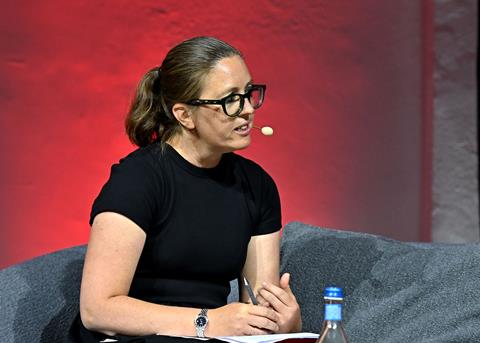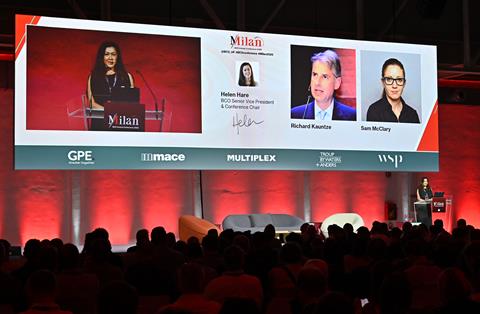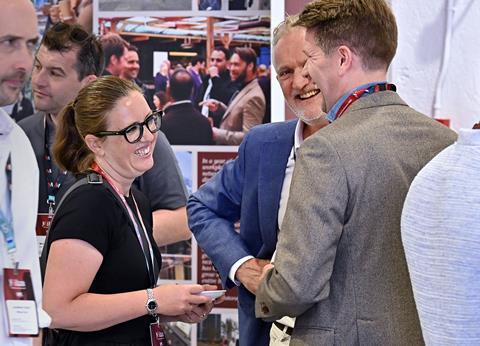Under the leadership of ex-journalist Samantha McClary, the office sector’s membership body wants to be more vocal, drive data sharing and modernise the organisation

You could not avoid the sense of a changing of the guard at this year’s British Council for Offices (BCO) conference in Milan.
It was the first time in more than two decades that the event had not been run under the leadership of long-time chief executive Richard Kauntze, who stepped back from the role just weeks before. It was also the first time his successor, Samantha McClary, had ever attended the conference, despite more than 20 years working in real estate journalism.
For some people, attending an event with more than 600 of your members just weeks into a role might be a bit of a baptism of fire, but McClary, the former editor of Estates Gazette, has ample experience dealing with developers, contractors and the like.
“No one’s been too pushy yet,” she reassured me when we sat down for a chat during the conference in the swish environs of Superstudio Events, a space more used to hosting fashion shows than property conferences. “It has been very very enjoyable [and it] doesn’t hurt that it’s in a beautiful city with lovely weather.”
>> Read more: The 2025 BCO conference: Key takeaways from this year’s event in Milan
But the event in Milan is not just an excuse for a quick trip abroad. McClary spent the three days picking the brains of delegates as she formulates her plans for the organisation. “There’s been a lot of feedback to me about how the industry has changed and how the BCO can play a really important role in that,” she says.
These changes, which have accelerated since the end of the pandemic, have seen office developers and owners seeking to provide more than just a workplace for their customers.
“It used to be very much, design a nice office building, and that would almost be enough,” says McClary. “Now it’s a whole ecosystem and it’s this product that lives and breathes”.
She alludes to a session at the conference, run by BCO’s NextGen programme, which saw delegates brainstorm what the organisation should look like in 2030.
An office isn’t just an office anymore. There is leisure, there is retail, there is public realm – you’ve got to have all these things to make a workplace work
“One of the questions on the board was ‘Should we still be the British Council for Offices’,” says McClary, recalling how attendees had questioned whether the organisation’s name should be retained. The answer is “probably yes”, McClary makes clear, for familiarity and brand recognition if nothing else.
But the discussion itself serves to make clear that people in the sector are aware of the fact that the buildings they own, develop or operate are no longer uni-purpose, and that the BCO is open-minded about its role going forward.
“An office isn’t just an office anymore,” says McClary. “There is leisure, there is retail, there is public realm – you’ve got to have all these things to make a workplace work.”
McClary and the rest of her leadership team seem to have a modernising vision for a BCO that reflects the changes that have taken place in the sector, with a more forthright role in speaking publicly on behalf of the sector and in sharing data within it.
Perhaps it is this spokesperson role that the BCO had in mind when it appointed a veteran journalist to be its new chief. McClary says she hopes her press experience will help her make the industry heard and says that her “storytelling skills are something new” in the BCO.
“One of the things I was most passionate about at Estates Gazette, and took a huge responsibility for, was you had this platform where every week you were given an opportunity to say something important,” she says. “I think the BCO could be such a powerful platform as well, to champion an industry that has been through massive transformation and is still going to keep going on that journey – and it needs a voice that is there to lift it up”.
It is clear that McClary‚Äôs ambition in this regard has cut through to members. Elsewhere in the conference, Turner and Townsend Alinea director Mark Lacey tells –«ø’¥´√Ω, unprompted: ‚ÄúI think what Sam‚Äôs trying to achieve with it being much more of a mouthpiece for the office industry is absolutely right‚Äù.
Business is really good at feeding back on projects – what went right, what went wrong – but as an industry we’re not very good at that
“I’ll pay him later,” jokes McClary when told this. She says she had the opportunity to “get policy makers to understand the workspace is a very important part of the UK economy and a very important tool for building communities” and to get the industry’s key concerns around planning and viability heard.
“I think it’s about our policymakers understanding the value and unlocking some of that capital for us through the conversations they have – bringing our sector into conversations as well, not just the housebuilders.”
Data is another issue that is a focus for the BCO going forward. “Business is really good at feeding back on projects – what went right, what went wrong – but as an industry we’re not very good at that,” says McClary.
Her desire to use the BCO as the platform to change this is backed by junior vice-president Helen Hare, who organised the Milan conference. Hare, who is also director of projects at GPE, says that the experience of being a judge for the BCO Awards and getting access to swathes of detailed project information showed her what the industry was missing.
She tells –«ø’¥´√Ω: ‚ÄúEvery year you‚Äôre getting an experience of exactly what the BCO has got at its fingerprints. We‚Äôve got it, but how can we share it?‚Äù

She acknowledges that financial data on schemes cannot necessarily be shared, but says specification details, as well as qualitative responses to new developments could be more readily shared.
Hare, who will be part of the BCO’s leadership team for the next year says data is “number one” on her agenda and “one of the first things” she spoke to McClary about.
“I completely agree with Helen,” says McClary. “There’s already so much data within the BCO and here is a real drive from everyone that I’ve spoken to here about wanting to share data now. That wasn’t necessarily the case five or 10 years ago. If we can create that platform, then there is a real benefit that the BCO can bring to its members”.
As well as expanding the BCO’s data and advocacy role, the current leadership seems to be keen on modernising the image and practices of the organisation itself.
Turner and Townsend Alinea’s Lacey says that in the past the BCO had been “a bit of an old boys club”, but that the Milan conference, for which he helped curate the programme, had brought “real positive change”, with more women and young people leading on organizing and presenting.
The shake-up of the BCO’s events programme goes beyond the conference too. Hare announced in her opening speech in Milan that the traditional president’s dinner held in the autumn would be replaced, probably with something more like a summer party.
Hare tells –«ø’¥´√Ω that the ‚Äúvery formal‚Äù event no longer fits in a world where ‚Äúexpense budgets have changed quite drastically‚Äù. Besides, she says, a lot of members ‚Äúfeel they get more out of the drinks for the half an hour before than they do the lunch itself‚Äù.
But, while Hare can put her stamp on the organisation for the next year, McClary is likely to be around for much longer if Kauntze’s 26-year term is anything to go by. McClary and the delegates might have their sticky-note ideas for the BCO in 2030, but operating in an industry that continues to undergo rapid changes, only time will tell what the organisation looks like in five years.
–«ø’¥´√Ω was the media partner for this year‚Äôs BCO conference





















No comments yet